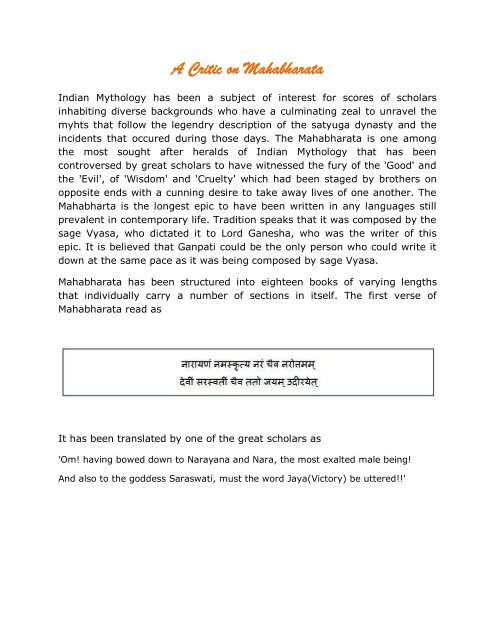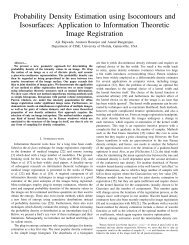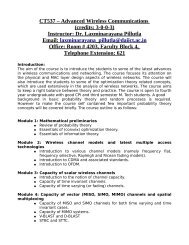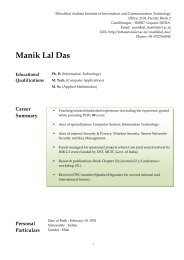A Critic on Mahabharata - DAIICT Intranet
A Critic on Mahabharata - DAIICT Intranet
A Critic on Mahabharata - DAIICT Intranet
Create successful ePaper yourself
Turn your PDF publications into a flip-book with our unique Google optimized e-Paper software.
A <str<strong>on</strong>g>Critic</str<strong>on</strong>g> <strong>on</strong> <strong>Mahabharata</strong><br />
Indian Mythology has been a subject of interest for scores of scholars<br />
inhabiting diverse backgrounds who have a culminating zeal to unravel the<br />
myhts that follow the legendry descripti<strong>on</strong> of the satyuga dynasty and the<br />
incidents that occured during those days. The <strong>Mahabharata</strong> is <strong>on</strong>e am<strong>on</strong>g<br />
the most sought after heralds of Indian Mythology that has been<br />
c<strong>on</strong>troversed by great scholars to have witnessed the fury of the 'Good' and<br />
the 'Evil', of 'Wisdom' and 'Cruelty' which had been staged by brothers <strong>on</strong><br />
opposite ends with a cunning desire to take away lives of <strong>on</strong>e another. The<br />
Mahabharta is the l<strong>on</strong>gest epic to have been written in any languages still<br />
prevalent in c<strong>on</strong>temporary life. Traditi<strong>on</strong> speaks that it was composed by the<br />
sage Vyasa, who dictated it to Lord Ganesha, who was the writer of this<br />
epic. It is believed that Ganpati could be the <strong>on</strong>ly pers<strong>on</strong> who could write it<br />
down at the same pace as it was being composed by sage Vyasa.<br />
<strong>Mahabharata</strong> has been structured into eighteen books of varying lengths<br />
that individually carry a number of secti<strong>on</strong>s in itself. The first verse of<br />
<strong>Mahabharata</strong> read as<br />
It has been translated by <strong>on</strong>e of the great scholars as<br />
'Om! having bowed down to Narayana and Nara, the most exalted male being!<br />
And also to the goddess Saraswati, must the word Jaya(Victory) be uttered!!'
I am here to pendown ma critics <strong>on</strong> any three of the stories of <strong>Mahabharata</strong>.<br />
The stories I have chosen as the Objects of my discussi<strong>on</strong> are<br />
Story of Eklavya<br />
Story of Savitri and Satyavan<br />
Story of Kacha and Devyani<br />
Story of Eklavya<br />
The story of EKlavya is the most prominous citati<strong>on</strong> of Untouchability being<br />
prevailant in those periods.The character Eklavya to me is the unsung<br />
legend who had been the victim of upper casts people. Here is the following<br />
story of Eklavya thts portraits a very simple and dedicated child who had the<br />
undying desire to be nurtured by the then greatest gurus Dr<strong>on</strong>acharya who<br />
used to teach <strong>on</strong>ly to the Kshtriyas, the then most priviledged and h<strong>on</strong>oured<br />
people of the period.<br />
Dr<strong>on</strong>a was the most sacred of all the gurus at that period. He used to teach<br />
the s<strong>on</strong>s of Kings to make them valiant warriors besides being the owners of<br />
great disciplined and spiritual life. The young princes were brought up in the<br />
sheds of the Gurus' houses were they were nourished with preachings of<br />
wisdom, sacrifice and acts of bravery. They were trained with utmost<br />
dedicati<strong>on</strong> to become the whos and whomes of mighty fights. They were<br />
then later returned to the dynasty to lead further as the future kings of their<br />
parent's dynasty as they inherited the thr<strong>on</strong>e to rule people.<br />
Caste System is <strong>on</strong>e the oldest practices that is still being practices in most<br />
of the parts of world. People are categorised depending <strong>on</strong> their caste,<br />
colour, creed, sex, etc. into various castes and they are treated accordingly.<br />
The period that witnessed <strong>Mahabharata</strong> also had such system. People were<br />
differentiated into four major castes, they are as followed
Kshatriyas<br />
Brahmins<br />
Vaishyas<br />
Shudras<br />
Shudras were the untouchables,to be optimically thought up<strong>on</strong> as the cursed<br />
people who had to live their lives in sole isolati<strong>on</strong> who had no rights to even<br />
dream of any legacy, luxury in their lives. The moment they were born, they<br />
were inhabited with sufferings of poverty, disgrace and pathetic lifestyle.<br />
They were born to serve others. Even a gossip with them by other cast's<br />
people was c<strong>on</strong>sidered to be a henious sin ever committed.<br />
On the c<strong>on</strong>trary Brahmins were the most respected people in the society<br />
who enjoyed a respectful place and were h<strong>on</strong>oured pers<strong>on</strong>s who used to<br />
summ<strong>on</strong> kings, princes and were resp<strong>on</strong>sible for dispersing great thoughts<br />
and preachings am<strong>on</strong>g the young kshtriyas and their disciples.<br />
Kshtriyas were the noble s<strong>on</strong>s who had the solemn authority to rule<br />
peasants. They were the most h<strong>on</strong>oured people who ruled several hectre's of<br />
lands and masses lead the most bountiful life in sheer legacy.<br />
The story:<br />
Near the ashrama of Dr<strong>on</strong>a, where Arjuna and his brothers used to take<br />
less<strong>on</strong>s in various arts, there lived a small bright boy, shudra by caste (lower<br />
caste). His name was Eklavya. He had great desire to learn the art of<br />
archery from Dr<strong>on</strong>acharya. But his mother had told him that as a shudra,<br />
Acharya Dr<strong>on</strong>a would not accept Eklavya as his disciple. It was futile to<br />
dream of such a privilege.But the boy was not be put off, his determinati<strong>on</strong><br />
knew no bounds. Near his house, under a tree Eklavya installed a clay idol of<br />
Dr<strong>on</strong>acharya that he worshiped as his Guru! Daily, morning and evening,<br />
this devotee put flower and naturalperfumes in fr<strong>on</strong>t of this image and took<br />
Self-Less<strong>on</strong>s in the art of bow and arrow.<br />
The talented young Eklavya so<strong>on</strong> acquired high knowledge in archery. He<br />
attributed his success to his Guru Dr<strong>on</strong>acharya.One day, as it happened,<br />
Acharya Dr<strong>on</strong>a and Arjuna were passing near the hut of Eklavya. It was<br />
pleasant and peaceful afterno<strong>on</strong> and people were taking rest. But the<br />
tranquility and silence was broken by c<strong>on</strong>stantbarking of a dog. Eklavya did
not like this, and therefore, he shut the mouth of the dog with an arrow!<br />
Dr<strong>on</strong>acharya and Arjuna were surprised to see the dogwith his mouth sealed<br />
with an arrow!<br />
Naturally the curious Arjuna asked his Gurudev as to who could have d<strong>on</strong>e<br />
this delicate job. Even Dr<strong>on</strong>acharya was amazed and knew the archer must<br />
be excepti<strong>on</strong>ally skilled artist. They decided to trace this skillful fellow and<br />
reached the spot where Eklavya was practicing w<strong>on</strong>ders with his bow and<br />
arrow in fr<strong>on</strong>t of the clay image of Dr<strong>on</strong>a. It took no time for Dr<strong>on</strong>acharya to<br />
understand the situati<strong>on</strong>. He realized that Eklavya was superior to Arjuna in<br />
some respects. Dr<strong>on</strong>acharya loved Arjuna verymuch and had declared him<br />
to be the best archer <strong>on</strong> the earth. Hence the Guru thought for awhile and<br />
came to a decisi<strong>on</strong> to remove Eklavya as a competitor to Arjuna.<br />
Dr<strong>on</strong>acharya went to Eklavya and said, "O young man, who has taught you<br />
such w<strong>on</strong>derful skills in archery! Who is your Guru?" Seeing the Guru in fr<strong>on</strong>t<br />
of him, the boy Eklavya was more that overjoyed and said, "Why, O<br />
Gurudev, this all is your grace! I worship you as my Guru. Look you are<br />
there in that image!"Dr<strong>on</strong>acharya was pleased with the dedicati<strong>on</strong> of<br />
Eklavya, and said, "I bless you my s<strong>on</strong>. But as is customary, w<strong>on</strong>'t you give<br />
me my fees - Guru-Dakshina!".It is customary in India to give to the Guru<br />
whatever he demands as his fees - Guru-Dakshina for the knowledge the<br />
Guru has given to the disciple.<br />
Eklavya was overwhelmed to see Dr<strong>on</strong>acharya had accepted him as his<br />
disciple! Out he said, "O H<strong>on</strong>orable Teacher, whatever you ask, this humble<br />
disciple of yours will try his utmost to offer you as Guru-Dakshina! I am<br />
blessed." And now comes a very touching and pathetic incidence in<br />
<strong>Mahabharata</strong>. Guru Dr<strong>on</strong>a said, "O Eklavya, I am pleased with your respect<br />
for Guru. I want the thumb of your right hand as my fees – Guru-Dakshina."<br />
The trees and atmosphere around stood still for a minute! Even Arjuna was<br />
stunned <strong>on</strong> listening to the unusual and almost cruel demand of his Guru.<br />
To ask for the thumb of an archer was equivalent to almost kill him! How<br />
could Dr<strong>on</strong>acharya demand such a heavy prize from <strong>on</strong>e disciple to protect<br />
the h<strong>on</strong>our of the other!But Eklavya had no such remorse. Unruffled and<br />
with due humility, cheerfully and without protest, he cut his right thumb and<br />
placed at the feet of Dr<strong>on</strong>acharya. Gods in the heaven silently praised the<br />
greatness of Eklavya's sacrifice.
Although this particular incident has not been <strong>on</strong>e the most promising<br />
mythical stories of <strong>Mahabharata</strong> but can u imagine what would have been<br />
the scenario if Eklavya would <strong>on</strong> c<strong>on</strong>trary be blessed to become <strong>on</strong>e of the<br />
disciples of Dr<strong>on</strong>a. He would have outshined Arjuna and rather would have<br />
been the sought after hero of the period. But the vanishing sinful act of<br />
Dr<strong>on</strong>a and the curse of him being a shudra shadowed his bravery and skill to<br />
just grovel in dust of a pityful life and misery. It is not that Eklavya wouldn't<br />
have imagined that if he procures the sacrificial traditi<strong>on</strong> he would be left<br />
with n<strong>on</strong>e other than being a just ordinary pers<strong>on</strong> and lead rest of his life<br />
with nothing but his sorrows and simplictiy. Though you can see the picture<br />
of respect and serenity in Eklavya who characterises the great values of<br />
respect for teachers and an h<strong>on</strong>est student who had left no grievances<br />
behind in isolati<strong>on</strong> of the act he did by sacrificing his right thumb unto the<br />
h<strong>on</strong>our of Dr<strong>on</strong>acharya, his <strong>on</strong>ly guru, the guru he had never been <strong>on</strong>e to<br />
<strong>on</strong>e in face with.<br />
But how come still such a sacrifice lay buried in most of the mythical spic's<br />
stories? How many scholars still find a reas<strong>on</strong> to debate that this can't be a<br />
part o the <strong>Mahabharata</strong>? Eklavya in not just an incident that had been there<br />
to be forgotten as time advances to the modern period but is to be taken<br />
into serious c<strong>on</strong>siderati<strong>on</strong> that there's no meaning in disgracing any pers<strong>on</strong>'s<br />
right to live at an equable par life with rest of hate humans. What's the<br />
wr<strong>on</strong>g if he's the infant of an untouchable's womb? Is that they follow a<br />
different mechanism to live life? Or is that they are brought to this terrifying<br />
world by gods and goddesses of their own and not the <strong>on</strong>es that we worship<br />
today. ? Still there exists a following that prevents such peasants from<br />
worshipping in temple. People feel alike to part away from them no so<strong>on</strong>er<br />
that they arrive closeby. Is this an act of shame? Or is this an act of<br />
preventi<strong>on</strong>, preventi<strong>on</strong> of <strong>on</strong>e's purity to lead a respectful life in today's<br />
society?<br />
Story of Savitri and Satyavan<br />
The myth occurs as a multiply embedded narrative in the <strong>Mahabharata</strong> told,<br />
most immediately, by Markandeya. When Yudhisthira asks Markandeya<br />
whether there has ever been a woman whose devoti<strong>on</strong> matched Draupadi‟s,
Markandeya replies by relating this myth. The childless king of Madras,<br />
Asvapati, lives ascetically for many years and offers oblati<strong>on</strong>s with the savitri<br />
manthra.<br />
Finally the Goddess Savitri appears to him and grants him a bo<strong>on</strong>,<br />
cauti<strong>on</strong>ing him not to complain: he will have a daughter. She is born and<br />
named Savitri in h<strong>on</strong>or of the Goddess. Savitri is born out of devoti<strong>on</strong> and<br />
asceticism, traits she will herself practice. We learn that the king is joyful at<br />
the prospect of a child, but the story hides his internal thoughts from the<br />
audience, allowing them to provide their own interpretati<strong>on</strong>.<br />
'tato vridhaan dwijaan sarv<strong>on</strong>ritwijaah supurohitaan!<br />
smahuye dine punya prayayo sah kanyayaa!!'<br />
When Savitri reaches the age of marriage, no man asks for her hand, so her<br />
father sets out with his daughter <strong>on</strong> a pilgrimage for this purpose and finds<br />
Satyavan, the s<strong>on</strong> of a blind king named Dyumatsena, living in exile as a<br />
forest-dweller. Savitri returns to find her father speaking with Narada who<br />
announces that Savitri has made a bad choice: although perfect in every<br />
way, Satyavan is irretrievably destined to die <strong>on</strong>e year from that day. In<br />
resp<strong>on</strong>se to her father‟s plea to choose a more suitable husband, Savitri<br />
insists that she will choose her husband but <strong>on</strong>ce. After Narada announces<br />
his agreement with Savitri, Asvapati acquiesces. This is Savitri‟s first c<strong>on</strong>flict<br />
with a powerful male figure: her father the king. Savitri‟s argument rests <strong>on</strong><br />
the authority of her mind. She says, “Having made the decisi<strong>on</strong> with my<br />
mind, I am stating it with my speech, and shall accomplish it with my<br />
acti<strong>on</strong>s later. My mind is my authority.” Savitri overcomes worldly power by<br />
appealing to the spiritual authority of her family‟s guru and her own interior<br />
self.<br />
Savitri and Satyavan are married, and she goes to live in the forest. Having<br />
given away his daughter with suitable robes, Ashvapati with a merry heart<br />
left for his own abode. Immediately after the marriage, Savitri takes <strong>on</strong> the<br />
clothing of a hermit and lives in perfect obedience and respect to her new<br />
parents-in-law and husband. She goes bey<strong>on</strong>d all expectati<strong>on</strong>s of proper<br />
behavior. Satyavana having obtained a wife graced with valuable and noble<br />
qualities and Savitri too having a res<strong>on</strong>soble and humble husband, rejoiced<br />
exceedingly.
After lapse of a l<strong>on</strong>g life, finally arrived the time of Satyavan's death. Three<br />
days before the foreseen death of Satyavan, Savitri takes a vow of fasting<br />
and vigil. Her father-in-law tells her she has taken <strong>on</strong> too harsh of a regime,<br />
but Savitri replies that she has taken an oath to perform these austerities, at<br />
which Dyumatsena offers his support. This is her sec<strong>on</strong>d c<strong>on</strong>flict with a<br />
powerful man, and she again appeals to a higher, spiritual commitment that<br />
he must recognize. The morning of Satyavan‟s predicted death, Savitri asks<br />
for her father-in-law‟s permissi<strong>on</strong> to accompany her husband into the forest.<br />
Since she has never asked for anything during the entire year she has spent<br />
at the hermitage, Dyumatsena grants her wish. The story juxtaposes the<br />
devoti<strong>on</strong> of Savitri to her father, parents-in-law, and husband with several<br />
critical moments where she defies their wishes.<br />
She justifies her defiance, which takes the form of devoti<strong>on</strong> and asceticism,<br />
through an appeal to a higher authority. She is being even more selfsacrificing<br />
and more devoted than the people around her expect, but she<br />
simultaneously dem<strong>on</strong>strates her strength and independence. While<br />
Satyavan is splitting wood, he suddenly becomes weak and lays his head in<br />
Savitri‟s lap. Yama himself comes to claim the soul of Satyavan. Savitri<br />
follows Yama as he carries the soul away. When he tries to c<strong>on</strong>vince her to<br />
turn back, she offers successive formulas of wisdom. First she praises<br />
obedience to the Law, then friendship with the strict, then Yama himself for<br />
his just rule, then Yama as King of the Law, and finally noble c<strong>on</strong>duct with<br />
no expectati<strong>on</strong> of return. Impressed at each speech, Yama praises both the<br />
c<strong>on</strong>tent and style of her words and offers any bo<strong>on</strong> except the life of<br />
Satyavan. She first asks for eyesight and a return to the thr<strong>on</strong>e for her<br />
father-in-law, then s<strong>on</strong>s for her father, and then s<strong>on</strong>s for herself and<br />
Satyavan. Finally Yama offers any bo<strong>on</strong> without excepti<strong>on</strong>, and Savitri<br />
chooses Satyavan‟s life.<br />
This is Savitri‟s final and most dramatic c<strong>on</strong>flict with a powerful male figure:<br />
Yama, the god of death. Yama clearly occupies the positi<strong>on</strong> of strength, but<br />
Savitri manages to overcome even death. Her argument lies in appealing to<br />
the Law, above even Yama.<br />
Savitri returns to Satyavan‟s body who awakens as though he has been in a<br />
deep sleep. In order to c<strong>on</strong>sole his parents who they fear must be worried,<br />
they set out to return that evening, Satyavan assisted by his wife.<br />
Meanwhile at their home, Dyumatsena regains his eyesight and searches
with his wife for Satyavan and Savitri. As the ascetics comfort and counsel<br />
the distraught parents, Savitri and Satyavan return. Since Satyavan still<br />
does not know what happened, Savitri relays the story to her parents-in-law,<br />
husband, and the gathered ascetics. As they praise her, Dyumatsena‟s<br />
ministers arrive with news of the death of his usurper. Joyfully, the king and<br />
his entourage return to his kingdom. Likewise, all the other bo<strong>on</strong>s happen.<br />
Markandeya assures Yudhisthira and the other exiles that Draupadi will also<br />
save them.<br />
The story enlightens the true sacrifice of a woman and her patr<strong>on</strong>age for her<br />
husband. The love that encirlces them unto the foreseen death of<br />
Satyavan's death between Satyavan and his beloved wife Savitri is an<br />
explanatory of true devoti<strong>on</strong> to the <strong>on</strong>es you love and sacrifice for their<br />
wellbeing. Rare are these things still to be foresoghted in modern times<br />
where peple barely hav time for their own. The h<strong>on</strong>est and judged decisi<strong>on</strong><br />
of hers to marry Satyavan brought peace, happiness and glory to every<strong>on</strong>e<br />
including her inlaws. The woman is a typical example of trust, faith and<br />
h<strong>on</strong>esty. H<strong>on</strong>esty in <strong>on</strong>e's words, trust am<strong>on</strong>g <strong>on</strong> another, and faith <strong>on</strong> the<br />
<strong>on</strong>es you bring so close to your heart, these are the truest recitings of a<br />
joyous life that even defies materialistic desires or lusts. It is written in the<br />
epic that Yama himself came to take away the h<strong>on</strong>ored soul of Satyavan.<br />
When being asked that generally Yama's emissaries come to take away men,<br />
Yama humbly replied to Savitri's quest by quoting<br />
'Ayam cha dharmsanyuktoh rupvaan gunsagarah!<br />
Narho matpurushairnetumatoshami swaymagatah!!'<br />
And he said, I have come here pers<strong>on</strong>ally c<strong>on</strong>sidering that my emissaries are<br />
not fit to bring such devoti<strong>on</strong>al and handsome pers<strong>on</strong>, endued with profound<br />
qualities, as vast as a sea. The vastness of the humble soul of Savitri can be<br />
imagined from the ocassi<strong>on</strong> when Yama delighted by her crouching accent<br />
asked her wishes except for the life of her husband. In reply, she aksed the<br />
weel being of her inlaws and to return the lost h<strong>on</strong>our of her father in law<br />
and his eyesight proving her to be most gracious daughter in law that have<br />
ever brrn produced in centuries.<br />
She had been just few words away from wordly fantasies and luxury but she<br />
elpoed all her desires in return of the happiness of her in laws. She brought
up herself as a true example of dedicati<strong>on</strong>, hospitality and sacrifice and<br />
sheer devoti<strong>on</strong>. Woman has for decades been known and recog<strong>on</strong>ized as the<br />
symbols of sacrifice and devoti<strong>on</strong>. But it is their wise qualities and subtle<br />
example of dedicati<strong>on</strong> in varied walks of their lives that make them outshine<br />
their peer males and earn a respectful positi<strong>on</strong> in society.<br />
Story of Kacha and Devyani<br />
The story revolves around a simple idealism of the relati<strong>on</strong>ship that b<strong>on</strong>ds<br />
between a Guru and a Disciple. The story also equally narrates the<br />
mysterical love that follows within, that is inevitable.<br />
A l<strong>on</strong>g time ago, when the Gods and Dem<strong>on</strong>s were still fighting for<br />
supremacy over the three worlds - Heaven (Aakash), Earth (Prithvi) and the<br />
Netherworld (Pataal) - they appointed their priests (Gurus) who would pray<br />
for them and advice them in matters c<strong>on</strong>cerning the war. The gods<br />
appointed Angiras Vrihaspati as their priest and the dem<strong>on</strong>s (Asuras), not to<br />
be left behind, appointed Bhargav Shukracharya to be their guru. Now both<br />
these brahmin priests were stalwarts in their fields and enjoyed a healthy<br />
rivalry too. They respected each other immensely but also indulged in a<br />
game of <strong>on</strong>e-up man ship.<br />
The war between the gods and asuras had started in earnest and both the<br />
priests were busy with their Yajnas and prayers to make their sides more<br />
powerful. Shukracharya, the priest of the dem<strong>on</strong>s, would breathe life into<br />
the dem<strong>on</strong>s who died in the battle and make them healthy again. He could<br />
do so because he was an expert in the knowledge of Sanjeevani (the art of<br />
breathing life in a dead being). This Sanjeevani Vidya (knowledge) was<br />
making the asuras str<strong>on</strong>ger and they were the obvious leaders in the fight,<br />
as they were not facing any casualties.<br />
The gods <strong>on</strong> the other hand were suffering great losses, as Vrihaspati, their<br />
guru, did not possess the Sanjeevani Vidya. The gods and their guru<br />
deliberated <strong>on</strong> this drawback and decided that some<strong>on</strong>e would have to go<br />
and learn this art of breathing life into a dead body from the guru of the<br />
dem<strong>on</strong>s. It was decided that Kacha, the s<strong>on</strong> of guru Vrihaspati, would go to<br />
the land of the dem<strong>on</strong>s to learn the Sanjeevani Vidya. Kacha went to<br />
Vrishparva, where Shukracharya had his Ashram (hermitage).
He introduced himself to the great priest, "Sire, I am the grands<strong>on</strong> of<br />
Maharishi Angira and the s<strong>on</strong> of Vrihaspati, the priest of gods. I implore you<br />
to accept me as your pupil. I promise to live the celibate life of a<br />
Brahmachari (student) and serve you for <strong>on</strong>e thousand years."<br />
Shukracharya was pleased with the humility of Kacha and accepted him as<br />
his pupil. He said, "I will treat you as if I am treating my friend Vrihaspati<br />
and I will be h<strong>on</strong>oured to accept you as my pupil."<br />
Kacha started his studies and would keep the guru happy with his behaviour.<br />
He would also take good care of the daughter of his guru, Devyani. Time<br />
passed and Kacha became Shukracharya's favourite pupil. After 500 years<br />
had passed, the dem<strong>on</strong>s learnt of the real purpose of Kacha's visit. They<br />
were incensed and feared that with the Sanjeevani Vidya, the gods would<br />
become more powerful. So they plotted to kill Kacha. One day, when Kacha<br />
was grazing the cattle in the jungle, the dem<strong>on</strong>s killed him, cut him into<br />
small pieces and fed him to the wolves. In the evening the animals returned<br />
without Kacha. Devyani, who was by now deeply in love with Kacha, was<br />
worried and went to her father. She told him that Kacha was missing and<br />
that he must do something to get him back. She said, "I fear that some<strong>on</strong>e<br />
has killed him or he is dead somewhere in the forest. Please use your<br />
knowledge to bring back my Kacha. I cannot live without him and shall die if<br />
he is not brought back from the dead."<br />
Shukracharya, who himself was f<strong>on</strong>d of Kacha, used his powers and<br />
breathed life into Kacha. All the pieces of Kacha tore open the stomachs of<br />
the wolves and joined together and Kacha came alive. He returned to the<br />
hermitage and thanked his guru.<br />
After a few days, the asuras again killed Kacha and <strong>on</strong> Devyani's request,<br />
Shukracharya again breathed life into him. The third time, the asuras killed<br />
Kacha, and burnt his body. They then took his ashes and mixed it with wine<br />
and requested Shukracharya to drink the wine. Shukracharya, who was<br />
unaware of the vile machinati<strong>on</strong>s of the asuras, drank the wine. When Kacha<br />
didn't return to the hermitage, Devyani again went to her father and<br />
requested him to bring Kacha back to life. Shukracharya started chanting<br />
the mantras which would bring Kacha to life. Kacha, who was inside the<br />
stomach of Shukracharya, revealed his dilemma from inside in a quiet voice.<br />
He said that he would not come out of the stomach of his guru, as that<br />
would mean killing his guru.
Shukracharya said, "S<strong>on</strong>, you are a great ascetic and very dear to me and<br />
my daughter. If you are not Indra, and if you are a Brahmin, then I shall<br />
teach you the Sanjeevani Vidya. And I know that you are not Indra, because<br />
<strong>on</strong>ly a brahmin could stay alive in my stomach for so l<strong>on</strong>g. Now, I shall teach<br />
you the secret knowledge of Sanjeevani so that you can come out of my<br />
stomach and then breathe life into me." Kacha said, "I have lived in your<br />
stomach, so I am your s<strong>on</strong>. You have breathed life into me and have taught<br />
me the art of Sanjeevani which is like the flow of Amrit (the divine ambrosia<br />
which gives eternal life) in my veins. I shall behave as a good s<strong>on</strong> should do<br />
because those who do not respect their guru, who is like a god for a pupil,<br />
deserves to rot in hell."<br />
Shukracharya, who was displeased with himself for drinking wine, which<br />
caused him to be irrati<strong>on</strong>al so that he could not see through the<br />
machinati<strong>on</strong>s of the asuras promised never to touch a drop of any<br />
intoxicants. He also laid out a rule for all the brahmins, that if they drink<br />
alcohol, they would be breaking divine rules and would deserve to rot in hell.<br />
They would not <strong>on</strong>ly spoil the good deeds of this life, they would also ruin<br />
their next birth, if they touched even a drop of wine.<br />
After this, he asked Kacha to tear open his stomach and come out. Kacha<br />
did as he was told and when he came out the guru died. Kacha used his<br />
knowledge of Sanjeevani and breathed life into his guru, like a dutiful s<strong>on</strong><br />
should do. He then stayed with Shukracharya till the completi<strong>on</strong> of his <strong>on</strong>e<br />
thousand years and so<strong>on</strong> it was time for him to leave. Devyani then<br />
approached him and told him of her love for him. She requested him to<br />
marry her according to the norms and take her with him. Kacha was now in<br />
a dilemma as he c<strong>on</strong>sidered the daughter of his guru as his sister, as was<br />
the correct c<strong>on</strong>duct for a rishikumar (s<strong>on</strong> of a guru). He said, "Sister, as I<br />
have lived in the same stomach from which you were born too, I am your<br />
brother. Therefore, due to this reas<strong>on</strong>, I am your brother, besides, you are<br />
the daughter of my guru, who is like a father to me. So I cannot marry you<br />
as you are my sister."<br />
Devyani was hurt and angry at Kacha's refusal and she cursed him. She said<br />
that all the knowledge that he had acquired from her father would be of no<br />
use to him. Kacha replied that he accepted her curses as inadvertently he<br />
had hurt her, but he would teach others what he had learnt and then they
would use it to the benefit of others. He also said that she had not<br />
c<strong>on</strong>sidered that he was bound by the rules of c<strong>on</strong>duct and had cursed him,<br />
therefore no Brahmin would marry her. He then took leave from his guru<br />
and went to the gods and his father where he used his knowledge for the<br />
benefit of others.<br />
To c<strong>on</strong>clude there may be many debatic views about the story. But the<br />
simplest thing to learn is that the b<strong>on</strong>dage of a student and a teacher is<br />
sacred and they share an uncomm<strong>on</strong> relati<strong>on</strong>ship, a relati<strong>on</strong>ship of faith and<br />
respect for <strong>on</strong>e another. It is the human nature that never gets <strong>on</strong>e‟s<br />
memories staled and <strong>on</strong>e way or the other we always try to comprehend the<br />
help d<strong>on</strong>e to us by helping the c<strong>on</strong>cerned pers<strong>on</strong> in his/her needs. The<br />
Nature has created this beautiful word „love‟ that fuitifies its fragrance all<br />
around and no <strong>on</strong>e can avert it. Its complimenting to the desires that a<br />
pers<strong>on</strong> follows for the other. It‟s a miraculous feeling that Devyani had in for<br />
Kacha. But to the c<strong>on</strong>trary kacha had no such thoughts prevelant in him as<br />
he thought himself as the s<strong>on</strong> of Shukracharya, thereby devyani being his<br />
sister. The anger that outbursted in devyani was expected but the way she<br />
selfishly thought of her broken dreams and cursed Kacha is not judged to<br />
the c<strong>on</strong>text. Love was vividly seen being turning into a fury, hatred and<br />
hence followed the curse. It did not take even a fracti<strong>on</strong> of sec<strong>on</strong>d that made<br />
her hostile for her own love whom she had mad alive a number of times.<br />
Love comes in through thousand ways. It‟s <strong>on</strong>ly the way you feel it to<br />
welcome with your delight. Was the acts of protecting Kacha just Devyani‟s<br />
feeling of love for him or was there a wisdom of humanity that aroused her<br />
instincts to help him live again and again. Would „Savitri‟ behave in the same<br />
manner as „Devyani ‟ if you replace the latter with the former? I would say<br />
that we are no <strong>on</strong>e to say as we never know what human desires have in for<br />
<strong>on</strong>eself. They vary from <strong>on</strong>e to other but what still prevails comm<strong>on</strong> in<br />
every<strong>on</strong>e is the principles we have been living up<strong>on</strong>.

















